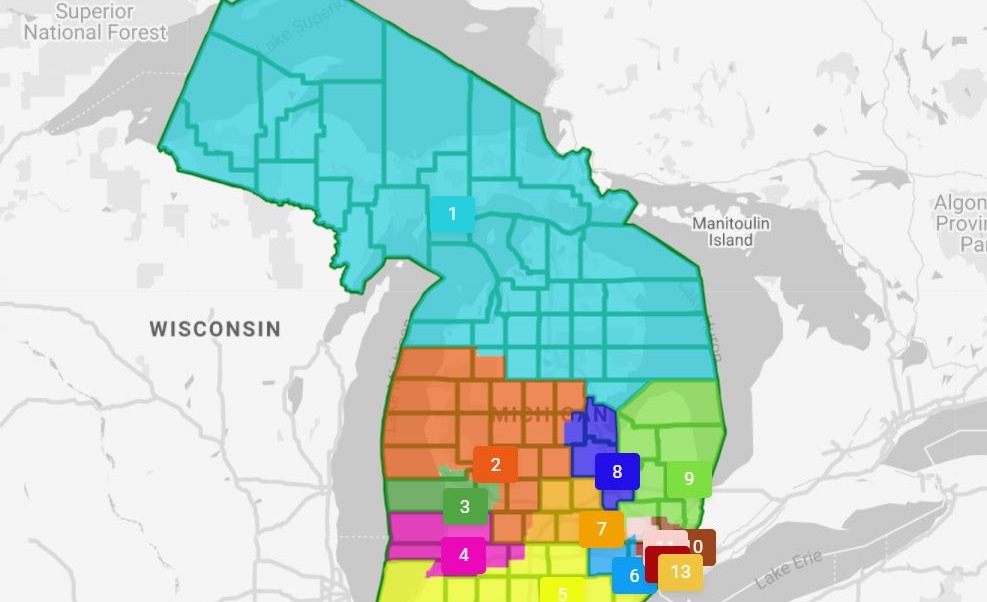Reactions to Michigan’s new district lines are all over the map
Some are critical of the congressional and especially the state Senate maps, while supporters counter that they create more opportunities for Black and Brown candidates to win seats by spreading out that representation over a larger number of districts.

Michigan’s redistricting commission has approved new legislative and congressional district maps. But that’s just the beginning of a new chapter of court battles and political maneuvering.
As part of the weekly series MichMash, Slate’s Cheyna Roth and WDET’s Jake Neher talk about what happens next.
Subscribe to MichMash on iTunes, Spotify, Google Podcasts, NPR One or wherever you get your podcasts.
It has been a very long road to get to this point where we have new maps — after years of a ballot campaign, lawsuits and hours upon hours of public meetings.
The reactions to the maps are all over the place. That’s even true on the redistricting commission itself. Some commissioners such as Detroit independent Anthony Eid said he can’t think of how the maps could have been better under the circumstances.
“I mean, we’re not choosing elections here,” Eid told Stephen Henderson on WDET’s Detroit Today. “Let’s make that clear. We’re trying to produce a fair map that allows candidates to run and get elected for office. And I think we did that.”
Others, including Commission Chair Rebecca Szetela, an independent from Canton, are critical of the congressional and especially the state Senate maps. She and others said they didn’t do enough to accommodate minority populations, especially in Southeast Michigan.
“I was one of the primary map drawers, so I feel like I have a deep understanding of the maps and where we could have improved them,” Szetela told Henderson during the same appearance on Detroit Today. “And I definitely think there are things that could have been improved upon if we had more time.”
Last week, the state saw the first major lawsuit seeking to throw out the maps in court, which is based on those same concerns about minority representation in these districts. A group of current and former lawmakers, as well as some political activists, said the maps violate the Voting Rights Act (VRA) by diluting minority populations. They said the VRA required the commission to draw more “majority-minority” districts, which would all but guarantee that candidates representing marginalized groups would win seats.
We’re not choosing elections here. Let’s make that clear. We’re trying to produce a fair map that allows candidates to run and get elected for office. And I think we did that.” — Commissioner Anthony Eid (I-Detroit), Michigan Independent Citizens Redistricting Commission
But supporters of the maps, including people like Commissioner Eid, counter that they create more opportunities for Black and Brown candidates to win seats by spreading out that representation over a larger number of districts.
We won’t know exactly who’s right until we start holding elections under these maps, but the court battles are sure to be contentious.
Finally, we can’t talk about this without talking about some political implications. These maps give Democrats a real opportunity to possibly win control of one or both of the state Legislative chambers in Lansing. Democrats haven’t had a majority in the state Senate since the early 1980s.
It will also mean some big shake-ups for incumbents who are now going to be moving or running against each other in the same districts, such as Democratic Michigan Reps. Andy Levin and Haley Stevens and Republican members of Congress Fred Upton and Bill Huizenga.
2022 has barely started and Michigan politics is already in uncharted territory.
More from MichMash:
Michigan Supreme Court Rules Against Redistricting Commission in First Major Lawsuit
The Biggest Political Blunders of 2021 in Michigan
Michigan Would Revert to Restrictive Abortion Ban If Roe v. Wade Is Overturned
Trusted, accurate, up-to-date.
WDET strives to make our journalism accessible to everyone. As a public media institution, we maintain our journalistic integrity through independent support from readers like you. If you value WDET as your source of news, music and conversation, please make a gift today.

